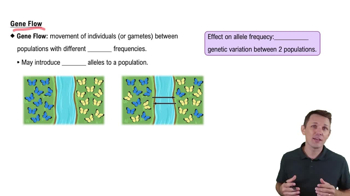In what sense is the Hardy–Weinberg principle a null hypothesis?

True or false? Gene flow can either increase or decrease the average fitness of a population. Explain.
 Verified step by step guidance
Verified step by step guidance
Verified video answer for a similar problem:
Key Concepts
Gene Flow

Average Fitness

Impact of Gene Flow on Fitness

Why isn't inbreeding considered an evolutionary process?
a. It does not change genotype frequencies.
b. It does not change allele frequencies.
c. It does not occur often enough to be important in evolution.
d. It does not violate the assumptions of the Hardy–Weinberg principle.
Why is genetic drift aptly named? Select True or False for each statement.
T/F It causes allele frequencies to drift up or down randomly.
T/F It occurs when alleles from one population drift into another.
T/F It occurs when mutations drift into a genome.
In a population of 2500, how many babies would you expect to have cystic fibrosis, a homozygous recessive condition, if the frequency of the dominant allele is 0.9 and the population is at Hardy–Weinberg equilibrium?
a. 0.9 × 2500 = 2250
b. 2 × 0.9 × 0.1 × 2500 = 450
c. 0.9 × 0.1 × 2500 = 225
d. 0.1 x 0.1 x 2500 = 25
In the 1700s and 1800s, royalty in Europe often married their close relatives; furthermore, recessive genetic diseases such as hemophilia showed up much more often among royals than in the general population. Explain the likely connection.
Determine what is incorrect in the following statement: Deer mice living on beaches mutated their genes so that they could have white fur color, providing better camouflage to survive on beaches.
